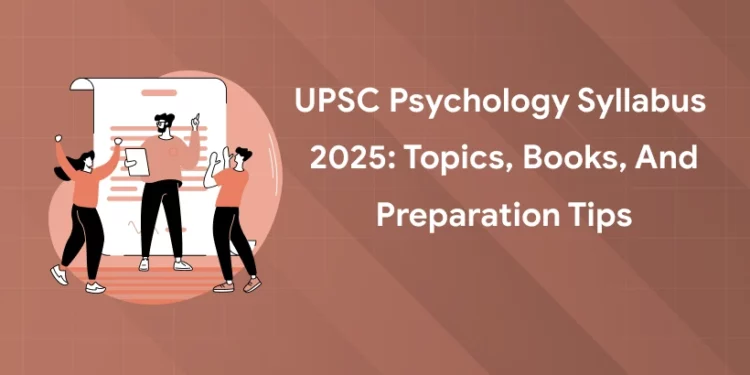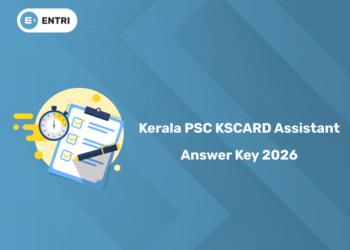Table of Contents
UPSC Psychology Syllabus: The UPSC Civil Services Examination is one of the most competitive exams in India, and selecting the right optional subject can significantly impact your performance. Psychology is a popular choice among aspirants, known for its relevance, scoring potential, and practical applications. In this blog, we’ll dive deep into the Psychology syllabus for UPSC 2025, its structure, preparation strategies, and tips to excel.
UPSC Psychology Syllabus 2025
Choosing Psychology as an optional for the UPSC Mains exam is a good choice for the student, who has a passion for humankind’s behavior and their mental processes, their psychological theories. It has a well-defined UPSC psychology syllabus; a determined candidate can give due time and efforts to really learn and master. This subject, with its theoretical and practical applications, provides a unique interface to the UPSC exam, fun to attempt and scoring to the aspirants.
| Aspect | Details |
|---|---|
| Exam Type | Civil Service Examination |
| Mode | Offline |
| Total Duration | 3 Hours |
| Total Papers | 2 Papers |
| Marks per Paper | 250 Marks |
| Total Marks | 500 Marks |
| Impact on Overall Score | A strong performance in Psychology can significantly boost the overall score in the UPSC Mains exam |
UPSC Psychology Syllabus 2025 Download PDF
1: Which one of the following is not a Harappan site?
UPSC Psychology mains Exam Get all the details related to downloading the UPSC Psychology Syllabus PDF from here. Click on the link below to download UPSC Psychology Syllabus 2025.
UPSC Psychology Syllabus 2025 Paper – I
Foundations of Psychology
- Introduction:Definition of Psychology; Historical antecedents of Psychology and trends in the 21st century; Psychology and scientific methods; Psychology in relation to other social sciences and natural sciences; Application of Psychology to societal problems.
- Methods of Psychology:Types of research: Descriptive, evaluative, diagnostic and prognostic; Methods of Research: Survey, observation, case-study and experiments; Characteristics of experimental design and non-experimental design, Quasi-experimental designs; Focused group discussions, brain storming, grounded theory approach.
- Research Methods:Major steps in Psychological research (problem statement, hypothesis formulation, research designs, sampling, tools of data collection, analysis and interpretation and report writing) Fundamental versus applied research; Methods of data collection (interview, observation, questionnaire); Research designs (ex-post facto and experimental); Application of statistical technique (t – test, two way ANOVA correlation, regression and factor analysis); Item response theory.
- Development of Human Behaviour:Growth and development; Principles of development, Role of genetic and environmental factors in determining human behaviour; Influence of cultural factors in socialization; Life span development – Characteristics, development tasks, promoting psychological well-being across major stages of the life span.
- Sensation, Attention and Perception: Sensation:concepts of threshold, absolute and difference thresholds, signal-detection and vigilance; Factors influencing attention including set and characteristics of stimulus; Definition and concept of perception, biological factors in perception; Perceptual organization-influence of past experiences, perceptual defence-factors influencing space and depth perception, size estimation and perceptual readiness; The plasticity of perception; Extrasensory perception; Culture and perception, Subliminal perception.
- Learning:Concept and theories of learning (Behaviourists, Gestaltalist and Information processing models); The Processes of extinction, discrimination and generalization; Programmed learning, probability learning, self-instructional learning, concepts; Types and the schedules of reinforcement, escape, avoidance and punishment, modeling and social learning.
- Memory:Encoding and remembering; Short term memory, Long term memory, Sensory memory, Iconic memory, Echoic memory: The Multistore model, levels of processing; Organization and Mnemonic techniques to improve memory; Theories of forgetting: decay, interference and retrieval failure: Metamemory; Amnesia: Anterograde and retrograde.
- Thinking and Problem Solving:Piaget’s theory of cognitive development; Concept formation processes; Information processing, Reasoning and problem solving, Facilitating and hindering factors in problem solving, Methods of problem solving: Creative thinking and fostering creativity; Factors influencing decision making and judgment; Recent trends.
- Motivation and Emotion:Psychological and physiological basis of motivation and emotion; Measurement of motivation and emotion; Effects of motivation and emotion on behaviour; Extrinsic and intrinsic motivation; Factors influencing intrinsic motivation; Emotional competence and the related issues.
- Intelligence and Aptitude:Concept of intelligence and aptitude, Nature and theories of intelligence – Spearman, Thurstone, Gullford Vernon, Sternberg and J.P; Das; Emotional Intelligence, Social intelligence, measurement of intelligence and aptitudes, concept of IQ, deviation IQ, constancy of IQ; Measurement of multiple intelligence; Fluid intelligence and crystallized intelligence.
- Personality:Definition and concept of personality; Theories of personality (psychoanalytical, sociocultural, interpersonal, developmental, humanistic, behaviouristic, trait and type approaches); Measurement of personality (projective tests, pencil-paper test); The Indian approach to personality; Training for personality development; Latest approaches like big 5 factor theory; The notion of self in different traditions.
- Attitudes, Values and Interests:Definition of attitudes, values and interests; Components of attitudes; Formation and maintenance of attitudes; Measurement of attitudes, values and interests; Theories of attitude change; Strategies for fostering values; Formation of stereotypes and prejudices; Changing others behaviour; Theories of attribution; Recent trends.
- Language and Communication:Human language – Properties, structure and linguistic hierarchy, Language acquisition- predisposition, critical period hypothesis; Theories of language development – Skinner and Chomsky; Process and types of communication – effective communication training.
- Issues and Perspectives in Modern Contemporary Psychology:Computer application in the psychological laboratory and psychological testing; Artificial intelligence; Psychocybernetics; Study of consciousness-sleep-wake schedules; dreams, stimulus deprivation, meditation, hypnotic/drug induced states; Extrasensory perception; Intersensory perception Simulation studies.
Crack UPSC with Expert Mentors! Get Free Demo Classes!
UPSC Psychology Syllabus 2025 Paper – II
Psychology: Issues and Applications
- Psychological Measurement of Individual Differences:The nature of individual differences; Characteristics and construction of standardized psychological tests; Types of psychological tests; Use, misuse and limitation of psychological tests; hical issues in the use of psychological tests.
- Psychological well being and Mental Disorders:Concept of health-ill health; Positive health, well being; Causal factors in mental disorders (Anxiety disorders, mood disorders, schizophrenia and delusional disorders; personality disorders, substance abuse disorders); Factors influencing positive health, well being, life style and quality of life; Happiness disposition.
- Therapeutic Approaches:Psychodynamic therapies; Behaviour therapies; Client centered therapy; Cognitive therapies; Indigenous therapies (Yoga, Meditation); Bio-feedback therapy; Prevention and rehabilitation of the mentally ill; Fostering mental health.
- Work Psychology and Organisational Behaviour:Personnel selection and training; Use of psychological tests in the industry; Training and human resource development; Theories of work motivation – Herzberg, Maslow, Adam Equity theory, Porter and Lawler, Vroom; Leadership and participatory management; Advertising and marketing; Stress and its management; Ergonomics; consumer psychology; Managerial effectiveness; Transformational leadership; Sensitivity training; Power and politics in organizations.
- Application of Psychology to Educational Field:Psychological principles underlying effective teaching-learning process; Learning styles; Gifted, retarded, learning disabled and their training; Training for improving memory and better academic achievement; Personality development and value education, Educational, vocational guidance and career counseling; Use of psychological tests in educational institutions; Effective strategies in guidance programmes.
- Community Psychology:Definition and concept of community psychology; Use of small groups in social action; Arousing community consciousness and action for handling social problems; Group decision making and leadership for social change; Effective strategies for social change.
- Rehabilitation Psychology:Primary, secondary and tertiary prevention programmes-role of psychologists; Organising of services for rehabilitation of physically, mentally and socially challenged persons including old persons, Rehabilitation of persons suffering from substance abuse, juvenile delinquency, criminal behaviour; Rehabilitation of victims of violence, Rehabilitation of HIV/AIDS victims, the role of social agencies.
- Application of Psychology to disadvantaged groups:The concepts of disadvantaged, deprivation; Social, physical, cultural and economic consequences of disadvantaged and deprived groups; Educating and motivating the disadvantaged towards development; Relative and prolonged deprivation.
- Psychological problems of social integration:The concept of social integration; The problem of caste, class, religion and language conflicts and prejudice; Nature and manifestation of prejudice between the in-group and out-group; Causal factors of social conflicts and prejudices; Psychological strategies for handling the conflicts and prejudices; Measures to achieve social integration.
- Application of Psychology in Information Technology and Mass Media:The present scenario of information technology and the mass media boom and the role of psychologists; Selection and training of psychology professionals to work in the field of IT and mass media; Distance learning through IT and mass media; Entrepreneurship through e-commerce; Multilevel marketing; Impact of TV and fostering value through IT and mass media; Psychological consequences of recent developments in Information Technology.
- Psychology and Economic development:Achievement motivation and economic development; Characteristics of entrepreneurial behaviour; Motivating and training people for entrepreneurship and economic development; Consumer rights and consumer awareness, Government policies for promotion of entrepreneurship among youth including women entrepreneurs.
- Application of psychology to environment and related fields:Environmental psychology-effects of noise, pollution and crowding; Population psychology: psychological consequences of population explosion and high population density; Motivating for small family norm; Impact of rapid scientific and technological growth on degradation of environment.
- Application of psychology in other fields:
(a) Military Psychology Devising psychological tests for defence personnel for use in selection, Training, counseling; training psychologists to work with defence personnel in promoting positive health; Human engineering in defence.
(b) Sports Psychology Psychological interventions in improving performance of athletes and sports. Persons participating in Individual and Team Games.
(c) Media influences on pro and antisocial behaviour.
(d) Psychology of terrorism. - Psychology of Gender: Issues of discrimination, Management of diversity; Glass ceiling effect, Self fulfilling prophesy, Women and Indian society.
Crack UPSC with Expert Mentors! Get Free Demo Classes!
Why Choose Psychology as an Optional?
Psychology has come to be a highly sought-after optional for several reasons:
- Logical and Conceptual Nature: Psychology works on concepts and theories that are easy to understand with proper guidance.
- Relevance Across Papers: Overlap with General Studies, Ethics Essay writing makes it an effective choice.
- Wide Applicability: It gives insights into human behavior, decision-making, and societal problems, which are also useful in interviews.
- Suitable for All Backgrounds: Even aspirants who do not have a background in Psychology can prepare well.
Crack UPSC with Expert Mentors! Get Free Demo Classes!
Best Psychology Books for UPSC
Studying Psychology as an Optional for your UPSC preparation can be beneficial, especially for specific papers like the optional subject or essay paper. Here are some recommended psychology books for UPSC preparation:
- “Psychology” by Robert A. Baron and Nyla R. Branscombe – This comprehensive textbook covers the fundamentals of psychology and is a good starting point for your studies.
- “Psychology” by Saundra K. Ciccarelli and J. Noland White – This is another well-regarded introductory psychology textbook that provides a solid foundation in the subject.
- “Psychology: Themes and Variations” by Wayne Weiten – It’s a popular psychology textbook that covers various themes and topics in psychology.
- “Introduction to Psychology” by Morgan and King – This book offers a thorough introduction to psychology and is a helpful resource for UPSC preparation.
- “Foundations of Psychology” by Nicky Hayes – This book provides an overview of key concepts and theories in psychology.
- “Psychology – The Science of Mind and Behaviour” by Richard Gross – It’s a well-structured book that covers various aspects of psychology.
- “Psychology: A Very Short Introduction” by Gillian Butler and Freda McManus – If you’re looking for a concise introduction to psychology, this book can be a good starting point.
- “Psychology: An Introduction” by Benjamin Lahey – This book offers a comprehensive overview of the field of psychology.
- “Social Psychology” by Elliot Aronson, Timothy D. Wilson, and Robin M. Akert – This is a great resource for the social psychology aspect of the UPSC syllabus.
- “Abnormal Psychology” by James N. Butcher, Susan M. Mineka, and Jill M. Hooley – For the section on abnormal psychology, this book is a valuable resource.
The UPSC Psychology syllabus for 2025 offers a great balance of theory and application, which makes it flexible and rich in outcomes. A good understanding of the syllabus combined with proper strategy will help aspirants march through their preparation road successfully.
Stay consistent, keep on revising regularly, and always keep the syllabus as your guiding framework. All the best!











